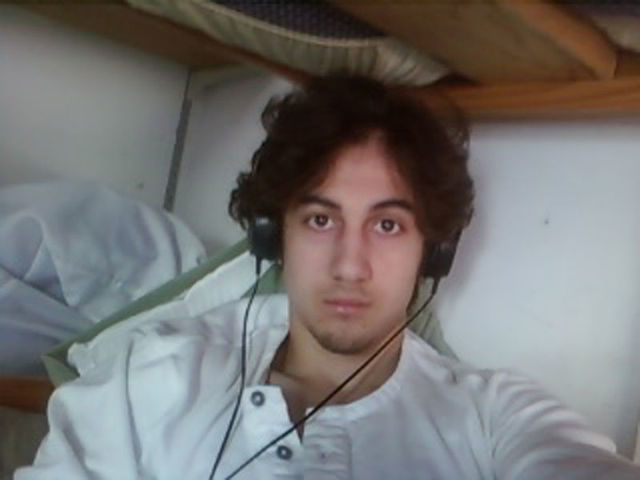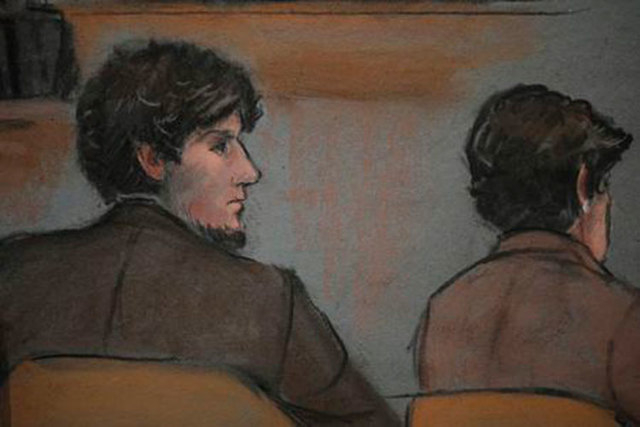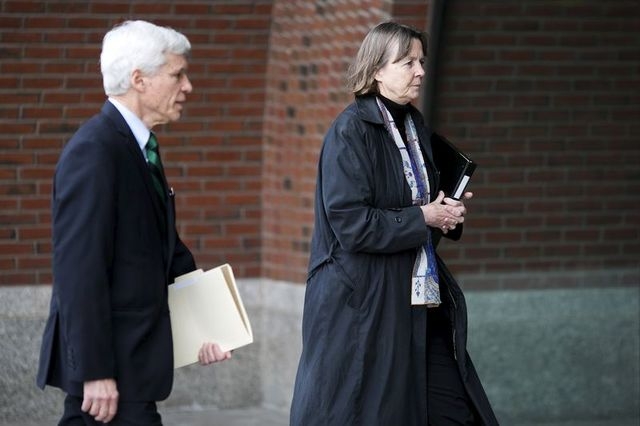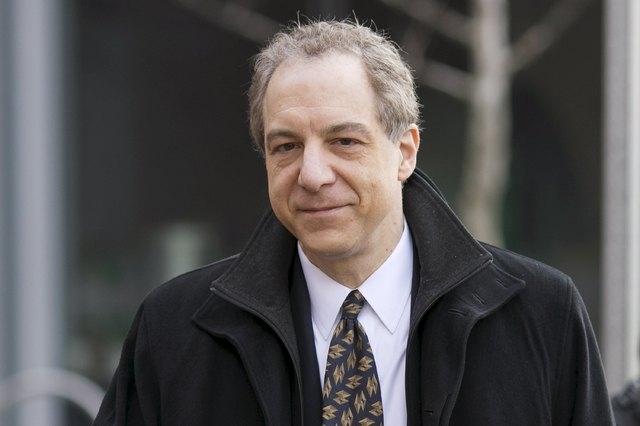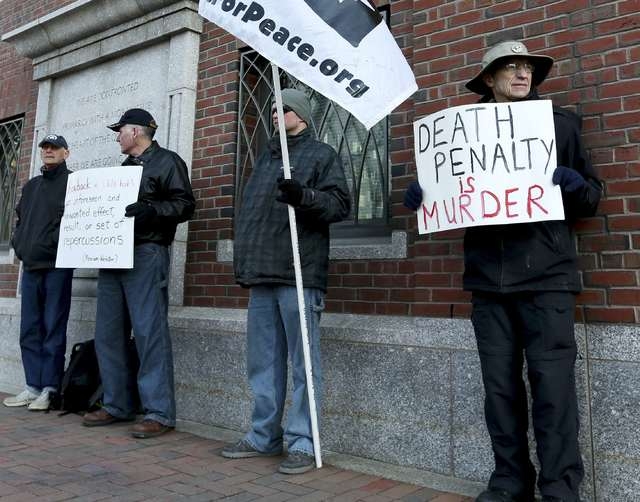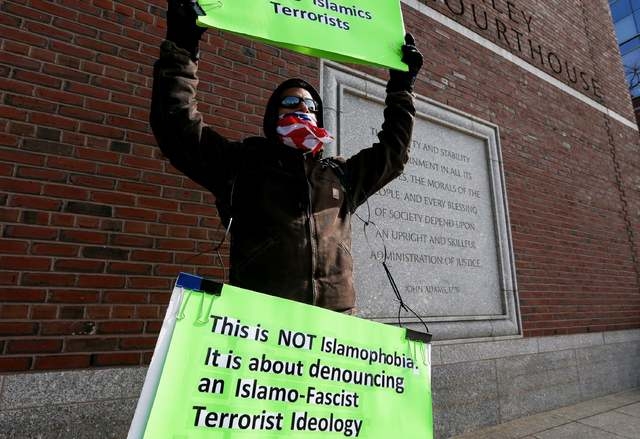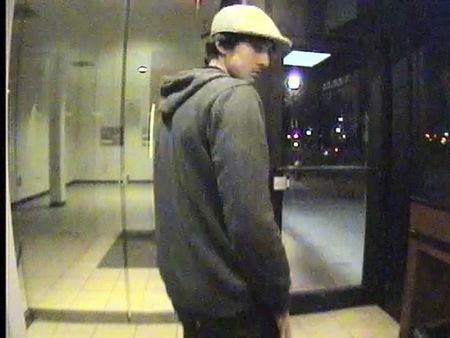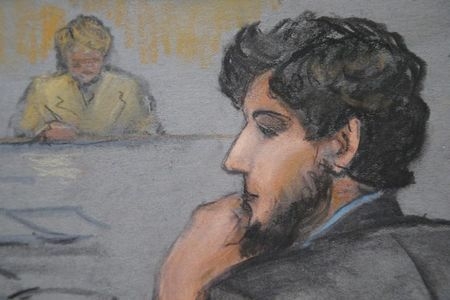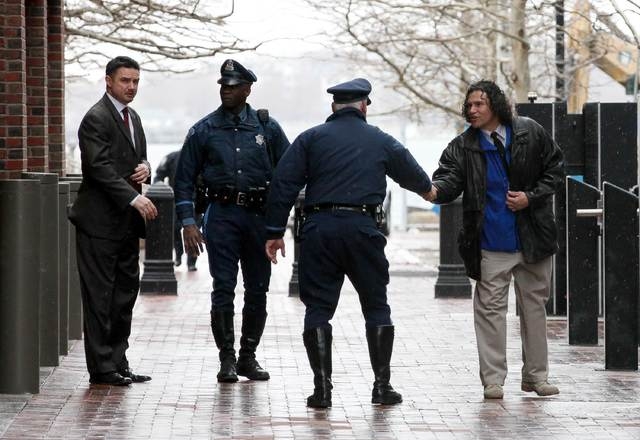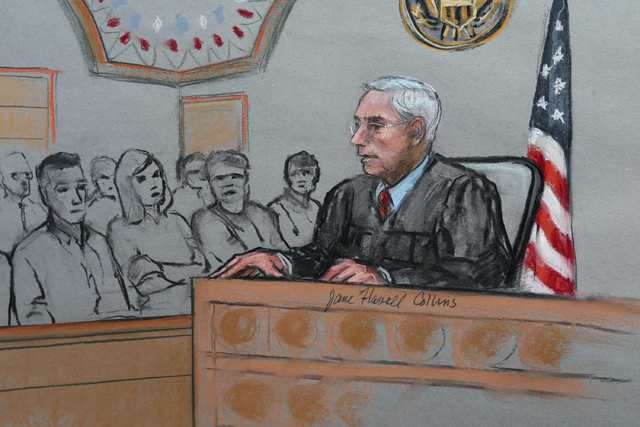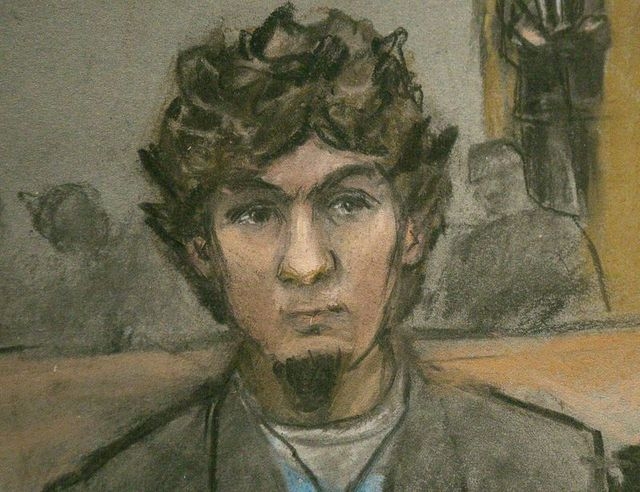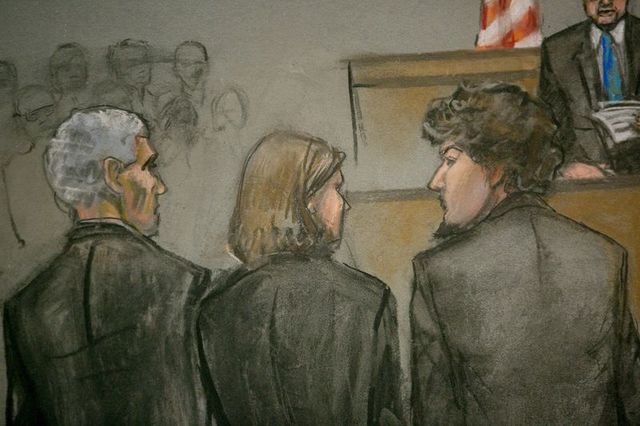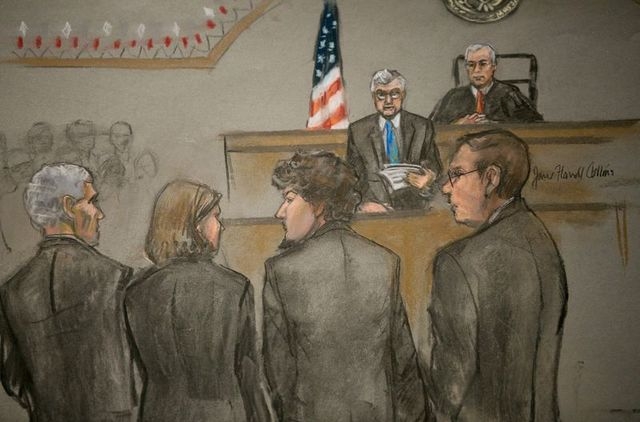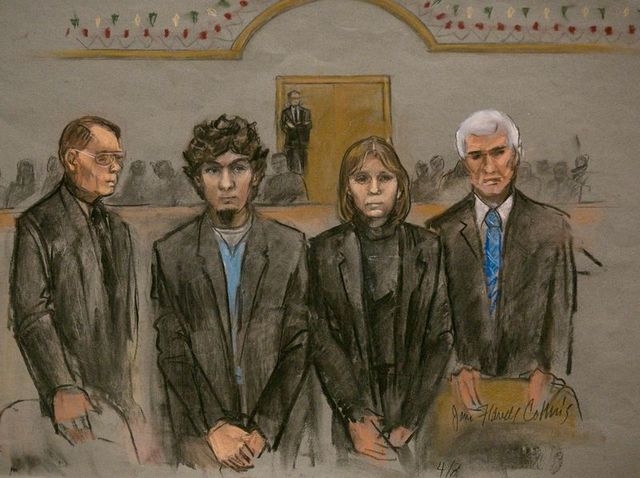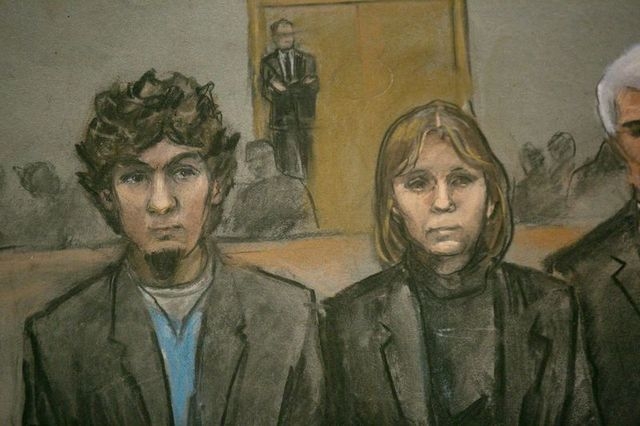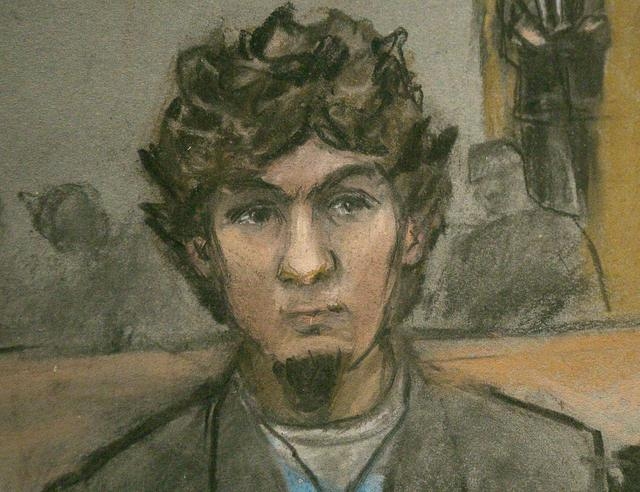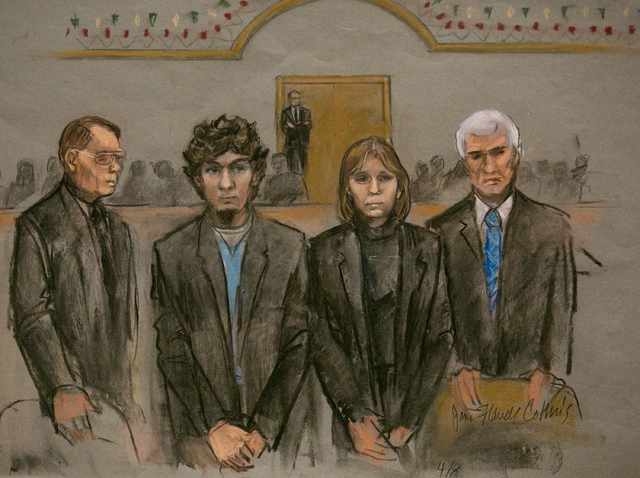Jury in Boston Marathon bombing finds Dzhokhar Tsarnaev guilty
BOSTON — A jury on Wednesday found Dzokhar Tsarnaev guilty of killing three people and injuring 264 in the 2013 Boston Marathon bombing, as well as fatally shooting a police officer four days later.
Tsarnaev, 21, was found guilty of all 30 counts against him, with 17 of the charges carrying the death penalty. The same U.S. District Court jury will now decide whether to sentence him to death or life in prison without possibility of parole.
Tsarnaev silently looked down, occasionally fidgeting, as the lengthy verdict was read. The courtroom was packed with survivors of the attack, the parents of 8-year-old Martin Richard, the youngest fatality, and law enforcement officials, including former Boston Police Commissioner Ed Davis.
Jurors spent just over 11 hours evaluating Tsarnaev’s guilt in two days of deliberations, following 16 days of testimony.
The amount of time spent in the jury room suggests the jurors were thorough in considering the charges, said David Weinstein, an attorney in private practice who in prior jobs as a state and local prosecutor brought death-penalty cases.
“If this was a fait accompli, they would have been out in the amount of time it takes to shuffle through 30 pieces of paper,” Weinstein said. “Sentencing deliberations are likely to take longer.”
Defense lawyers began the trial by admitting that Tsarnaev carried out the April 15, 2013, bombing but said he did so at the bidding of his older brother Tamerlan, 26, who died following a gunfight with police in Watertown, Massachusetts.
Prosecutors laid out evidence that the defendant, an ethnic Chechen who immigrated from Russia a decade before the attack, had read and listened to jihadist materials, and wrote a note in the boat where he was found hiding suggesting the bombing was an act of retribution for U.S. military campaigns in Muslim-dominated countries.
The blasts killed restaurant manager Krystle Campbell, 29, Chinese exchange student Lingzi Lu, 23, and Richard. Tsarnaev also was found guilty of the fatal shooting of Massachusetts of Institute of Technology police officer Sean Collier, 26.
Federal prosecutors detailed jihadi writings, including a copy of al Qaeda’s “Inspire” magazine with an article on bomb-making found on of Tsarnaev’s computers, describing that as evidence that he was an extremist who wanted to “punish America.”
DARK MEMORIES FOR BOSTON
The trial, which began in early March after a two-month jury selection process, dredged up some of worst memories in living memory in Boston. The twin pressure-cooker bombs ripped through the crowd of spectators at the race’s finish line, setting off a mad rush to save the hundreds of people wounded, many of whom lost legs.
Three days later, the Federal Bureau of Investigation released images of the Tsarnaev brothers, saying they were the suspected bombers and seeking information on their identities. That set the stage for 24 hours of chaos as the duo fatally shot Collier in an unsuccessful attempt to steal his gun and went on to carjack a Chinese entrepreneur before police found them in the suburb of Watertown.
The pair fought a desperate gunfight with police, throwing a smaller pressure-cooker bomb similar to the ones they used at the race, as well as smaller pipe bombs. When Tamerlan Tsarnaev ran out of bullets in the rusty Ruger handgun his brother had borrowed from a drug-dealing friend, he charged Watertown police officers who were trying to wrestle him to the ground. Dzhokhar then hopped into the carjacked Mercedes SUV and sped toward the group, running over his brother and dragging him.
The city’s mayor, Marty Walsh, said he was glad to see the trial moving toward a conclusion.
“I am thankful that this phase of the trial has come to an end and am hopeful for a swift sentencing process,” Walsh said. “I hope today’s verdict provides a small amount of closure for the survivors, families, and all impacted by the violent and tragic events.”
RELIEF IN BOSTON
Tsarnaev’s conviction on Wednesday came as a relief to residents of the city, though many expressed mixed feelings over whether the 21-year-old should be put to death for his crimes.
“I’m glad the verdict came out this way. It is a first step toward closure, honestly,” said Armando DiCianno, 34, a consultant from Boston who said he was nearby when the homemade pressure-cooker bombs ripped through the crowd of runners, volunteers and spectators.
But DiCianno said he was less certain what outcome he hoped for in the sentencing phase. “I have always been against the death penalty, but when something like this happens to you, your opinions change a little bit,” he said.
Even survivors of the bombing attack have mixed feelings about putting the former student at University of Massachusetts-Dartmouth to death for his crimes.
After the verdict was read, bombing survivor Karen Brassard said at a news conference that she and other survivors were grateful for the guilty verdict. But she said the survivors also had differing views on whether Tsarnaev deserves the death penalty.
Massachusetts scrapped the death penalty in 1984, but capital punishment is still available in cases that are under federal jurisdiction. Polls of Boston residents have shown the city generally favoring life in prison for Tsarnaev.
One poll released by Boston’s NPR news station WBUR in March showed 62 percent would favor life in prison for Tsarnaev, while 27 percent favored execution. A survey conducted by the Boston Globe in 2013, five months after the bombings, found 33 percent wanted him put to death.
Boston Cardinal Sean O’Malley and Massachusetts Roman Catholic bishops said this week in a statement that it would be against church teaching to execute Tsarnaev.
“The defendant in this case has been neutralized and will never again have the ability to cause harm. Because of this, we, the Catholic Bishops of the Commonwealth of Massachusetts, believe that society can do better than the death penalty,” the statement said.



